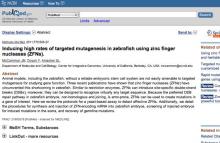
All MCB honors students must write an abstract for a poster (fall and spring) or symposium (spring only) presentation. Keep in mind that there are almost always more applicants for symposium presentations than there are speaking slots. Abstracts not chosen for oral presentations are automatically assigned to the poster session.
Your abstract should be modeled after abstracts of articles published in scientific journals in your field of interest. They should summarize the big picture of your project, the major question(s) addressed, and your results and their relevance. This example is from the journal NATURE's "Instuctions for Authors" guide.
General Guidelines
- Your abstract should be clear and concise. Word limit: 300 words or fewer.
- Your abstract should be written so that any graduating MCB student can understand the general relevance of your work.
- Be judicious with jargon and acronyms. If you use abbreviations that are specific to a narrow field of study, define them. You don’t need to define general terms like DNA or RNA, but you should define more specific terms like NMD (nonsense-mediated decay), DMZ (dorsal marginal zone), etc. the first time you use them.
- You may be writing an abstract for a project that is not yet “complete.” For example, you may not have finished collecting all the data for all your experiments. In this case, it is acceptable to describe the experiment(s) and then indicate that the most recent data and interpretation(s) will be presented. In some cases, it may be appropriate to briefly discuss possible results and how they would support, modify, or disprove your hypothesis.
- Your abstract must be submitted to your research PI and/or lab mentors for review. Give them enough time to provide meaningful input and make sure that you have sufficient time to consider their comments and incorporate changes. It is not appropriate to allow reviewers only 1-2 hours before the abstract submission deadline! Your mentors should not re-write your abstract; abstract writing should be a learning experience for you and may require multiple rounds of comment and revision.
- You should understand that for any multi-author abstract, manuscript, or presentation, ALL authors must read the submission and agree to be named as an author.
Honors Abstract vs. Journal Abstract
There are some differences between an honors abstract and a published abstract, especially if you are competing for a symposium presentation. In a published article, the individual contribution of each author on a multi-author paper is generally not indicated in the abstract. However, for an MCB Honors abstract, it is helpful for reviewers to understand which data were (a) generated previously in the lab (thus provided for background), (b) generated by collaborative experiments between you and others in the lab, and (c) generated independently by you.
Below are passages from two abstracts describing the same project. In the first example, it is impossible to distinguish the honors student's contribution to the work. In the second example, the work of the student is clearly differentiated from previous studies and/or collaborative work with others.
Final Words of Advice
Remember, there is no one “one-size-fits-all” template for an MCB abstract. A well-written abstract provides enough background and context so that the reader can understand the relevance of your work and enough data to demonstrate that you have made progress toward addressing your hypothesis. Keep asking yourself, “Why am I telling the reader this? Why is including this information important?” Keep it CLEAR and CONCISE. Good luck!